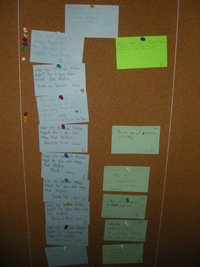I was recently asked the following question:
“I’ve been dropped into a situation best described as “story card hell.” How do I reduce complexity of the software project planning without losing features?”
The project was to replace an existing system. The behavior was largely known. As a result, the initial planning generated enough cards to feel like, “way too much detail up front.”
My answer:
Don’t lose the work you’ve done but don’t place more value in it than it has.
Step back to think of the application as a phased set of releases. Talk with the team and product owner about a way of delivering the system in meaningful pieces that customers could (and hopefully will) use. Get creative with defining those steps as long as they lead you down a path towards your ultimate goal.
Once you have that road map. Do an exercise with the team to group your existing stories into those releases. There will be a natural tendency to add and change stories. That’s fine but don’t get too distracted by it. The main point is to get a sense of the relative size of the releases and move the bulk of the stories out of your immediate planning concern.
Now focus on the first release. Spend more time on those stories but still not with the scrutiny of an iteration plan. Make/allow the team to live with ambiguity. Set up an agreed upon rule of thumb for how much bigger a “theme” is from a real “story” and let the team know it’s okay to discuss these things at the “theme” level.

Then prioritize your release backlog. Have the team chunk the remaining vague stories/themes into future iterations for that release. This is your release plan. Expect it to change. Again, you’re getting a rough sense of how many iterations in the first release and moving later stories out of your immediate concern.
Now you can focus in detail on the stories for the next one or two iterations without getting drowned in details. Don’t be surprised if future stories become irrelevant or drastically change as you get to the iteration within which they fall. It’s okay.
My answer was based on what we’ve tried to do at Oxygen with coaching on release planning from Hubert Smits.
Here’s the full thread off LinkedIn.
